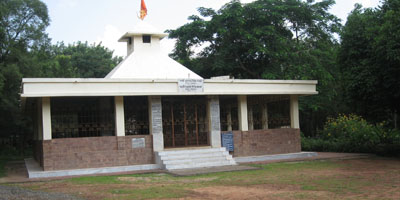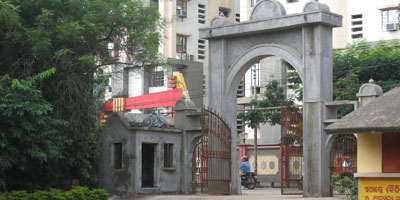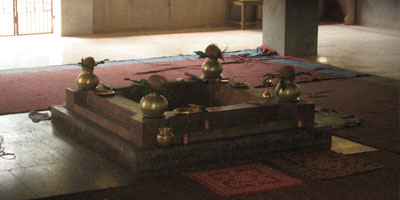AryaSamaj bhubaneswar (Religious Society) - a perfect place for conducting marriage
The main aim of Arya Samaj Mandir (Bhubaneswar) is to "Awaken The World with Vedic Light" with the ultimate goal of "Krinvanto Vishvam Aryam - Make the World noble". It is a perfect place for conducting marriages. The marriage is done with vedic rituals in a sacred manner. The vedic mantras are explained to the people in Oriya, Hindi & English. The marriage duration on vedic rituals is 2 hours. 1st session starts from 10am to 12 am & the second is from 2pm to 4pm. The Aryasamaj temple closes at 6pm.
The parents of bride & bridegroom needs to visit Aryasamaj & sign the marriage form as token of consent. Marriage celebration will be in day time only. Affidavit from notary needs to be submiited to Aryasamaj from both sides (Specimen copies can be provided upon request).
Aryasamaj - Vedic Wedding Ceremony
Swagat & Introduction (Welcome): Welcome and greetings are extended to the bridegroom, bride, family and friends.
Kanya Agaman (Arrival of the Bride):The bridesmaids and the father escort the bride to the Mandap (nuptial canopy).
Jai Mala (Exchange of Garlands): The priest guides the couple to the Mandap (nuptial canopy). Bride welcomes Groom with a floral garland and Groom garlands Bride. This exchange symbolizes formal acceptance and respect.
Madhupak (Offerings): Bride offers the mixture of honey and yogurt to the groom. Honey symbolizes the sweetness of eternal love and yogurt for the sake of his eternal good health and nutrition.
Aachman (Purification): Sipping the water three times for the purification of the heart and body.
Agni Pradipan: Kindling of sacred fire. The wedding is made solemn before Agni (fire), the symbol of knowledge, power, and purity, as a principle witnesses to the ceremony.
Kanya Daan (Giving hand of bride): The prime wealth of a Hindu household is the daughter (Kanya), who symbolizes the Hindu Goddess of Wealth (Lakshmi). Bride's parents will place her hands into Groom's and pour holy water over them to finalize the gesture of gift giving (transfer of wealth). Bride's father requests Groom to accept his daughter as an equal partner in all walks of life. It is noted in Vedic scriptures that there is no "Daana" (gift) greater than Kanya Daan (giving a daughters hand in marriage). Groom promises to accept Bride as his equal life partner.
Jaya Home (Offerings): Offerings in to sacred tire emphasize the couples' joint responsibility in maintaining the love and dignity of their union.
Paani Graham (Accepting the Hand): The bridegroom holds the hand of the bride and both of them solemnly pledge before God that they have become one and will forever love each other and remain mutually devoted for the remainder of their lives.
Pledges (Exchange of vows): The priest reads the solemn union declaration. The bride and bridegroom exchange the holy marriage vows.
Groom: Capacity 100 persons (Theatre Style)
The Sports Club - I take your hand in mine, for the attainment of prosperity and offspring. May you enjoy long life and happiness with me. By the grace of God and blessings o fall assembled, you have become my life partner and wife. You are my lawful wife and I am your lawful husband.
Bride: I take your hand in mine in pursuit of righteousness for the benefit of both our families. I will stand by you. May we be provided with prosperity and offspring and may I keep you splendidly radiant as the rays of the sun.
Mangal Phera: Bride's brother puts rice in the hands of Bride & Groom to offer to Agni (the Lord of Fire) who dispels darkness and ignorance while leading into light and knowledge. The couple then walks around the sacred fire. Each round represents the four basic goals of human life:
- Dharma: Moral sense to lead a good life
- Artha: Financial prosperity
- Kama: Blessing for strong, virtuous children and to share the responsibilities of home
- Moksha : Self restraint and eternal physical, mental and spiritual strength Together the four goals symbolize the couple's commitment to each other, the community and the cosmos. During the first three rounds Bride leads Groom and during the last round Groom leads.
Shila Rohan: A rock is placed in the north east comer of the Mandap. While Bride places her right foot on the piece of rock, Groom recites a hymn the Ashma Bhava. The statement is to encourage his wife to be as strong as the rock, to be firm towards any difficulties of life they may face together. Rice and flowers are sprinkled on the couple by her parents, relatives and friends.
Saptapadi (Seven steps): The bride and groom take seven steps forward together, symbolizing the beginning of their journey through life. These steps signify the guiding principles of life.
Each of these steps represents the vows made by the couple:
- Together we will love, cherish and respect one another from this day forward, for better for worse, for richer or poorer, in sickness or in health ... forever.
- Together we will create a home full of joy and laughter, where we find serenity and strength.
- Together we will share a steadily deepening love, which grows in understanding and unselfishness.
- Together we will embrace each other's family as well as our own yet to come. Let us have a measure of patience and forgive with grace.
- Let us have a measure of patience and forgive with grace.
- Together we will develop a sense of value that we may care for people more than possessions, for honor more than honors, and for the dimensions of a home more than the details of a house.
- Let us forever be best friends and partners, share each other's ideas and ideals. The couple is now united and will pray for the blessings from God. The father-in-law offers the bride a sacred necklace.
Sindhoor Daan: The bridegroom puts Sindhoor (Red Powder) in the parting of the bride's hair and welcomes her into his life as his eternal partner. The newly wedded couple touches the feet and takes blessings from the parents of both families.
Akhand Subhagyavati: Married women from the bride's family come forth to wish her eternal happiness.
Aashirvaad: All guests and relatives recite a hymn with the priest to wish the couple good luck, prosperity and a long, happy married life together.
Shanti PathHymn of peace


